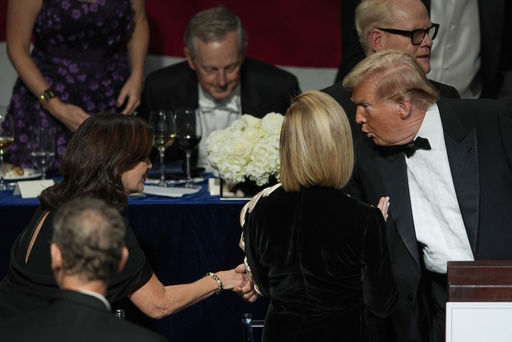
ALBANY, N.Y. — As President-elect Donald Trump prepares to take office, several influential Democratic governors are recalibrating their strategies to foster a productive rapport with his incoming administration. The governors, while acutely aware of their party’s inclination to adopt a confrontational stance against Trump’s initiatives, are presently adopting a more measured approach to avoid upsetting the balance and ensuring cooperation.
They find themselves in a challenging situation, balancing the necessity to vigorously defend their values and advocate for their constituents while also seeking opportunities for collaboration. New Jersey Governor Phil Murphy articulated this perspective, emphasizing the need to actively resist any threats to communities or individuals while simultaneously identifying potential areas for agreement.
Similarly, New York Governor Kathy Hochul stated her intention to oppose Trump’s policies, particularly concerning reproductive rights, although she has also expressed optimism about the possibility of bipartisan cooperation. Hochul, who had previously criticized Trump during her campaign efforts, noted that their discussions post-election have revealed some shared interests, particularly in areas like federal infrastructure funding.
When asked about the possibility of pardoning Trump regarding his recent legal issues, Hochul’s response was notable; she acknowledged the existing pardoning process in New York, leaving the discussion open-ended with a touch of humor.
Earlier this year, a jury found Trump guilty on multiple counts related to efforts to sway the 2016 election through financial payments to an adult film actor, an event that has colored current political interactions.
In contrast, some Democratic governors have opted for a more confrontational approach. California Governor Gavin Newsom, a staunch adversary of Trump, has called state lawmakers back to advance funding for legal defenses against anticipated challenges from the Trump administration. He expressed a desire to safeguard California’s progressive laws from potential federal overreach.
In a more collaborative vein, governors J.B. Pritzker of Illinois and Jared Polis of Colorado formed an initiative known as Governors Safeguarding Democracy, focusing on fortifying democratic principles and legal frameworks within their states.
Polis himself is navigating a nuanced course, publicly supporting Trump’s nomination of Robert F. Kennedy Jr. as head of Health and Human Services, expressing hope that Kennedy will take decisive action against large pharmaceutical companies and corporate interests.
Massachusetts Governor Maura Healey has since adopted a less aggressive demeanor compared to her previous role as Attorney General, where she was involved in multiple lawsuits against Trump’s policies. Now, she has prepared for a different tone, given that Massachusetts is a Democratic stronghold with a significant percentage of voters who supported Trump.
Healey expressed the need to assess whether Trump will follow through on his campaign promises while maintaining the state’s resistance to enforcing certain immigration laws.
Michigan’s Governor Gretchen Whitmer, who was vocal about the implications of Trump’s presidency during the election, has now chosen to step back from strong commentary. She aims to prioritize finding common ground with Trump on issues beneficial for the state, like economic development, rather than delving into aggressive opposition strategies.
In summarizing her intent, Whitmer stated that past collaborations with Trump’s administration would serve as a framework for future interactions, as she strategies on effectively navigating the next two years of her term amidst a Trump presidency.

